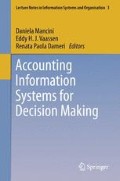Abstract
The aim of this chapter is to highlight the potential role of integration of Accounting Information System (AIS) and Knowledge Management Systems (KMS) for strategic control. The benefits of this integration can be expressed in terms of better support to knowledge conversions and enhanced access to knowledge embedded in tacit models by applying knowledge discovery techniques for model externalization. We propose a modified version of PROFSET model as a tool for realizing the integration: combining elements from AIS (to calculate product profitability) and KMS (to discover regularities in the purchase behaviour of customer), the PROFSET model can enhance the quality of support provided to decision makers and produce benefits that cannot be realized with any one system.
Access this chapter
Tax calculation will be finalised at checkout
Purchases are for personal use only
Notes
- 1.
A frequent itemset of size 1 is also named frequent item.
- 2.
The PROFSET model assumes that the sum of all M(X) approximates the overall profitability of product assortment.
- 3.
According to data, customers buy the maximal subset X {beer, peanuts} two times more frequently than the maximal subset Y {cheese, peanuts}, and consequently we can say that it is more likely that the real customer’s purchase intention has been {beer, peanuts} instead of {cheese, peanuts}.
References
Merchant, K.A., Otley, D.T.: A review of literature on control and accountability. In: Chapman, C.S., Hopwood, A.G., Shields, M.D. (eds.) Handbook of Management Accounting Research, vol. 2, pp. 785–802. Elsevier, Amsterdam (2007)
Chenhall, R.H.: Management control system design within its organizational context: Findings from contingency-based research and directions for the future. Acc. Organ. Soc. 28, 127–168 (2003)
Emmanuel, C., Otley, D., Merchant, K.: Accounting for Management Control. Thomson Learning, London (2004)
Thierauf, R.J., Hoctor, J.J.: Optimal Knowledge Management: Wisdom Management System Concepts and Applications. Idea Group Publishing, Hershey (2006)
Alavi, M., Leidner, D.E.: Knowledge management and knowledge management systems: Conceptual foundations and research issues. MIS Q. 25(1), 107–136 (2001)
Lupu, A.M., Bologa, R., Lungu, I., Bra, A.: The impact of organization changes on business intelligence projects. In: Proceedings of the 7th WSEAS International Conference on Simulation, Modelling and Optimization, pp. 414–418. WSEAS Press, Stevens Point (2007)
Kleinberg, J., Papadimitriou, C., Raghavan, P.: A microeconomic view of data mining. Data Min. Knowl. Discov. J. 2(4), 311–324 (1998)
Wang, H., Wang, S.: A knowledge management approach to data mining process for business intelligence. Ind. Manage. Data Syst. 108(5), 622–634 (2008)
Zimmerman, J.L.: Accounting for Decision Making and Control. Irwin McGraw-Hill, Boston (2000)
Nicolau, A.I.: A contingency model of perceived effectiveness in accounting information systems: Organizational coordination and control effects. Int. J. Acc. Inf. Syst. 1, 91–105 (2000)
Chong, V.K.: Management accounting systems, task uncertainty and managerial performance: A research note. Acc. Organ. Soc. 21, 415–421 (1996)
Mia, L., Chenhall, R.H.: The usefulness of management accounting systems, functional differentiation and managerial effectiveness. Acc. Organ. Soc. 19, 1–13 (1994)
Chong, V.K., Eggleton, I.R.: The decision-facilitating role of management accounting systems on managerial performance: The influence of locus of control and task uncertainty. Adv. Acc. 20, 165–197 (2003)
Hopper, T., Scapens, R.W., Northcott, D.: Issues in Management Accounting. Financial Times Prentice Hall, Upper Saddle River (2007)
Polany, M.: The Tacit Dimension. Routledge and Keoan Paul, London (1967)
Nonaka, I.: A dynamic theory of organizational knowledge creation. Organ. Sci. 5(1), 14–37 (1994)
Baldvinsdottir, G., Mitchell, F., Nørreklit, H.: Issues in the relationship between theory and practice in management accounting. Manag. Acc. Res. 21(2), 79–82 (2010)
Kasanen, E., Lukka, K., Siitonen, A.: The constructive approach in management accounting research. J. Manage. Acc. Res. 5, 64–243 (1993)
Baker, C.R.: A plea for action research in accounting information systems. In: Koch, N. (ed.) Information Systems Action Research—An Applied View of Emerging Concepts and Methods, pp. 395–404. Springer, Heidelberg (2007)
Baskerville, R., Wood-Harper, A.T.: Diversity in information systems action research methods. Eur. J. Inf. Syst. 7(2), 90–107 (1998)
Mohrman, S.A., Gibson, C.B., Mohrman, A.M.: Doing research that is useful to practice: A model and empirical exploration. Acad. Manag. J. 44(2), 357–375 (2001)
Assudani, R.H.: Dispersed knowledge work—Implications for knowledge intensive firms. J. Knowl. Manage. 13(6), 521–532 (2009)
Niiniluoto, I.: Critical Scientific Realism. Oxford University Press, New York (2002)
Brijs, T., Swinnen, G., Vanhoof, K., Wets, G.: A data mining framework for optimal product selection in retail supermarket data: the generalized PROFSET model. In: Proceedings of the ACM Seventh International Conference on Knowledge Discovery and Data Mining, pp. 300–304. ACM Press, New York (2001)
Agrawal, R., Mannila, H., Srikant, R., Toivonen, H., Verkamo, A.: Fast discovery of association rules. In: Fayyad, U., Piatetsky-Shapiro, G., Smyth, P., Uthurusamy, R. (eds.) Advances in Knowledge Discovery and Data Mining, pp. 307–328. AAAI Press, Menlo Park (1996)
Author information
Authors and Affiliations
Corresponding author
Editor information
Editors and Affiliations
Rights and permissions
Copyright information
© 2013 Springer-Verlag Berlin Heidelberg
About this chapter
Cite this chapter
Del Gobbo, R. (2013). Accounting Information Systems and Knowledge Management Systems: An Integrated Approach for Strategic Control. In: Mancini, D., Vaassen, E., Dameri, R. (eds) Accounting Information Systems for Decision Making. Lecture Notes in Information Systems and Organisation, vol 3. Springer, Berlin, Heidelberg. https://doi.org/10.1007/978-3-642-35761-9_8
Download citation
DOI: https://doi.org/10.1007/978-3-642-35761-9_8
Published:
Publisher Name: Springer, Berlin, Heidelberg
Print ISBN: 978-3-642-35760-2
Online ISBN: 978-3-642-35761-9
eBook Packages: Business and EconomicsBusiness and Management (R0)

